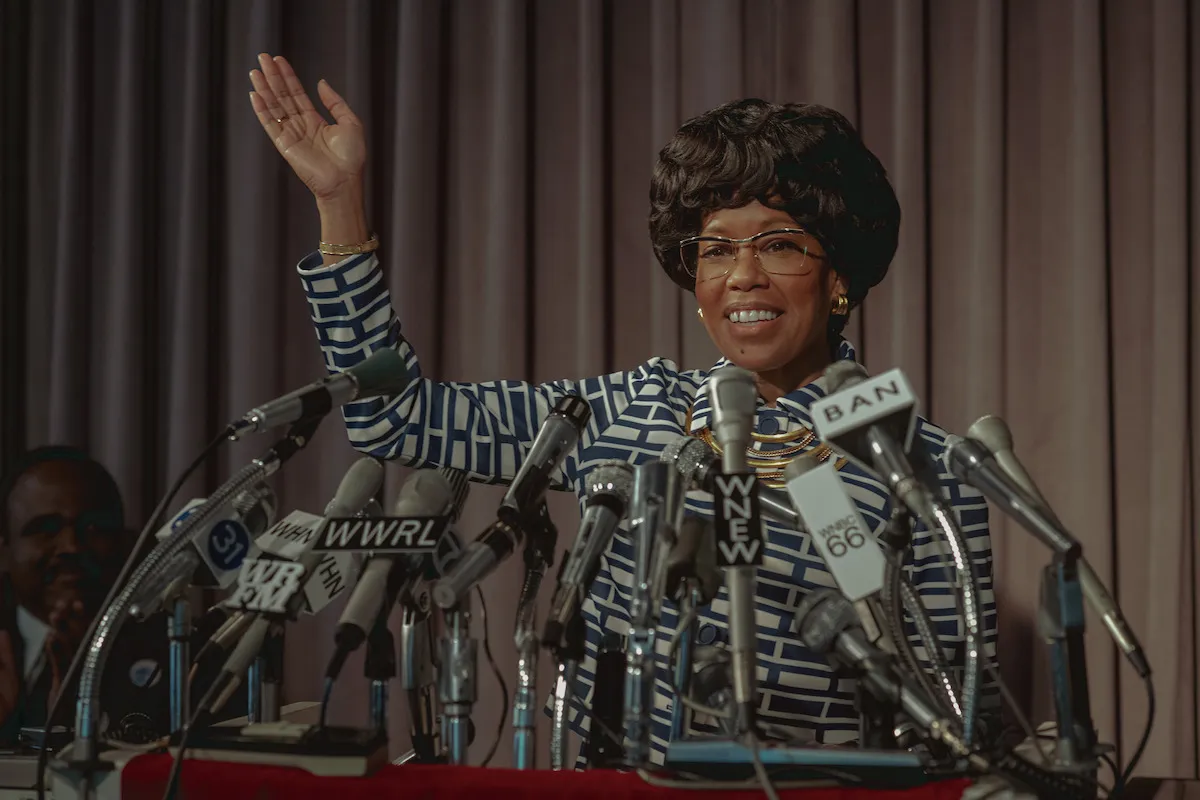
Film Review: Shirley
Film
Shirley
Director: John Ridley
Participant Media and Royal Ties Productions
Streaming on Netflix: 03.22
Shirley is probably coming out at the wrong time. During a time when more people are looking to Netflix right now to avoid thinking about presidential elections, a political biopic may not be audience’s first choice. On the other hand, as a reminder of the importance of getting out the vote to make meaningful change, maybe it’s a good time after all.
In 1968, Shirley Chisholm (Academy Award winner Regina King, If Beale Street Could Talk) is a freshman congresswoman from New York’s 12th district. The first Black woman elected to serve in the House of Representatives, Shirley arrives in Washington, D.C. eager to make a difference and too often finds herself sidelined by white male colleagues, even those from her own party. As she gradually establishes a presence and national recognition, she makes the bold decision to make a historic run for the Democratic Presidential nomination in 1972. It’s an uphill battle, and Shirley’s husband, Conrad (Michael Cherrie, She Paradise) isn’t sure that he supports the idea. Nevertheless, Shirley assembles a crack team that includes political strategist Wesley ‘Mac’ Holder (Lance Reddick, John Wick), businessman and civic leader Arthur Hardwick Jr. (Terrence Howard, Hustle & Flow,), and a young law student named Robert Gottlieb (Lucas Hedges, Manchester By The Sea). While the campaign starts out as a less than a longshot, the groundswell of support and momentum that builds leads Shirley all the way to the Democratic convention.
Shirley is nicely shot and it moves briskly enough, but it’s lacking in inspiration, even in focus and basic structure. Writer/director John Ridley, who won an Oscar in 2014 for 12 Years A Slave, and producer King, made the right choice in centering the story around the 1972 campaign rather than making it a cradle-to-the-grave biography, though the downside is that it’s so laser focused on this period in time that there’s a fair amount of context that’s simply missing. While figures such as George McGovern, George Wallace and Huey P. Newton are likely to be familiar to a fair section of the audience and are well introduced even if they are not, many of the film’s more obscure major characters remain as unsung heroes of history, getting only a vague hum here, and we get too little feel for who they are, how they got here or why they are important. When a closing credits sequence mentions Shirley Chisolm’s second marriage to none other than Arthur Hardwick Jr. in 1977, it might as well include the words “which explains why we even bothered to pay Terrence Howard enough to play such a dull role.” The film is by far at its best when focusing on the race between Shirley Chisolm and hardcore segregationist Wallace, both of whom survived assassination attempts during the campaign. When Shirley defies all council to do otherwise and visits Wallace in the hospital after he is shot, Ridley trusts the audience to come to the realization on their own that in the modern political age, even the era of Wallace and Nixon can be used as an all but bygone ideal of statesmanship.
King is the driving force here, both in a long journey to get Shirley Chisolm’s story to the screen and in her powerhouse performance, making every speech an inspirational moment of true beauty. She’s also quite strong in the more intimate sequences, whether it’s the aforementioned scene opposite a very effective W. Earl Brown (The Highwaymen) as Wallace, or the compelling drama of the toll the campaign is taking on Shirley and Conrad’s marriage. The rest of the ensemble plays their parts well enough, with the late Reddick standing out as the best of the bunch, and Hedges getting some good moments along the way. Reina King (To Sleep With Anger), Regina’s real life sister and co-producer, does very nice work as Muriel, Shirley’s estranged sister, and the chemistry between them is palpable.
Shirley is a good film that is ultimately too by-the-numbers to be be called a great one, and it definitely left me wanting in terms of character development. It’s still a worthwhile effort, and the best live action feature that Netflix has put out out so far this year. It’s worth a look, even if it falls short of being the awards season candidate that the streamer will need to excite the kind of voters it’s most hoping to inspire. –Patrick Gibbs
Read More Biopic Reviews:
Film Review: Bob Marley: One Love
Film Review: Rustin